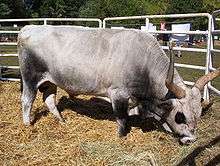Hungarian Grey cattle
|
Hungarian Grey cattle in Hortobágy National Park Puszta, the first and largest national park of Hungary | |
| Conservation status | |
|---|---|
| Other names |
|
| Country of origin | Hungary |
| Use | dual-purpose, draught and beef |
| Traits | |
| Weight | Male: 800 kg[2] |
| Female: 525 kg[2] | |
| Height | Male: 150 cm[2] |
| Female: 136 cm[2] | |
| Skin color | slate-coloured, dark grey at natural openings |
| Coat | shades of grey, from silvery white to ash grey |
| Horn status | long slender horns, round in cross-section |
|
Cattle Bos primigenius | |



The Hungarian Grey (Hungarian: Magyar szürke szarvasmarha) is an ancient breed of domestic beef cattle indigenous to Hungary.[2][3]
The breed belongs to the group of Podolic cattle[4][5] and is well adapted to extensive pasture systems. It originates from the Hungarian lowlands and may also be known as Hungarian Steppe Cattle.
Characteristics
Hungarian Grey cattle are slender and tall. The bulls reach a height of 145 to 155 cm and a weight of 800 to 900 kg, the cows 135 to 140 cm and 500 to 600 kg.
The colour ranges from silvery-white to ash-grey. As in other Podolic breeds, the calves are born wheat-coloured, and become grey at about three months old. Hungarian Grey cattle are robust, unpretentious, easy-calving and long-lived. Their horns are directed upward and are long and curved.
History
The breed probably arrived with the 9th century Hungarian immigration from the east to the Hungarian lowlands. In the Middle Ages and early modern times the breed was used as a draught animal but from 1861 has been bred for early maturity and its beef quality, being herded live to the markets of Europe. Nowadays Hungarian Grey cattle are kept mainly as tourist attractions in the Hortobágy National Park and other Hungarian national parks. Small herds may be found in a few other places, e.g. Bocfölde, Western Hungary. These herds serve as gene banks, due to their reported resistance to cattle diseases which affect more highly bred cattle types. By 1975 there were only 300 cows left in two herds, but numbers have since increased.
See also
References
- ↑ Barbara Rischkowsky, D. Pilling (eds.) (2007). List of breeds documented in the Global Databank for Animal Genetic Resources, annex to The State of the World’s Animal Genetic Resources for Food and Agriculture. Rome: Food and Agriculture Organization of the United Nations. ISBN 9789251057629. Accessed May 2014.
- 1 2 3 4 5 Breed data sheet: Magyar Szürke/Hungary. Domestic Animal Diversity Information System of the Food and Agriculture Organization of the United Nations. Accessed May 2014.
- ↑ FAO study; The state of agricultural biodiversity in the livestock sector p94
- ↑ Imre Bodó, István Gera, Gábor Koppány, trans. Béla Borsos (2004). The Hungarian Grey Cattle Breed. Budapest: Magyar Szürke Szarvasmarhát Tenyésztôk Egyesülete.
- ↑ László Bartosiewicz (1997). The Hungarian Grey cattle: a traditional European breed. Animal Genetic Resources Information (21): 49–60.
| Wikimedia Commons has media related to Hungarian Grey Cattle. |
